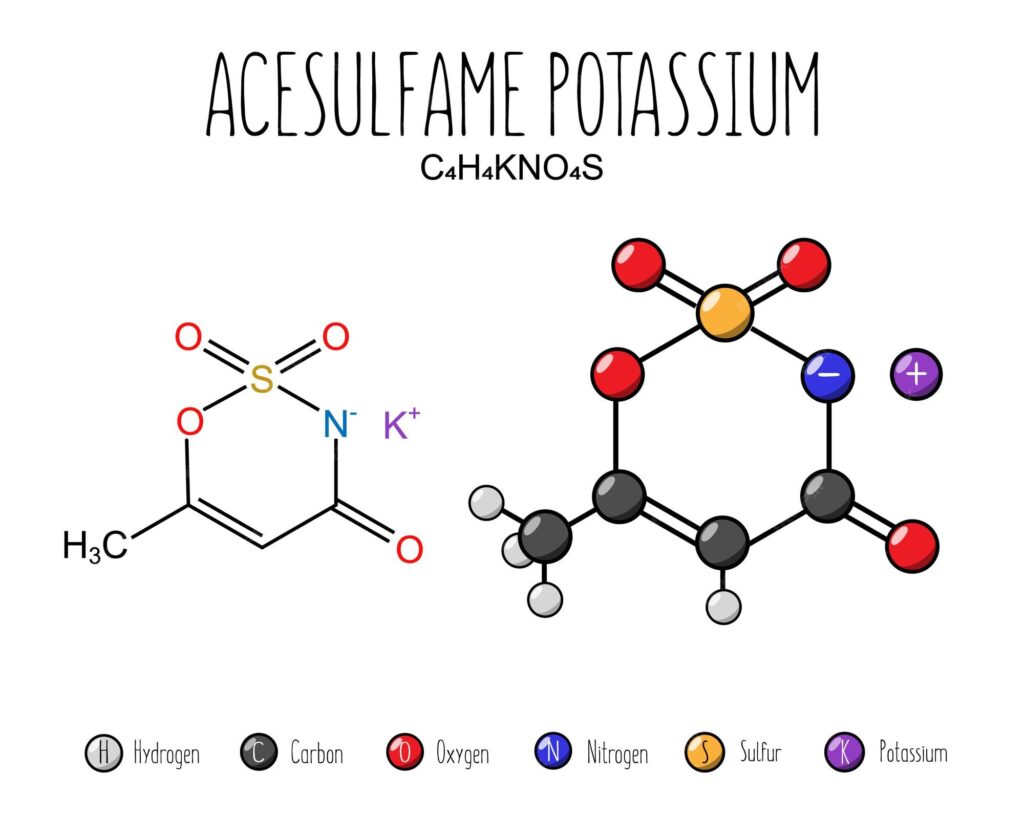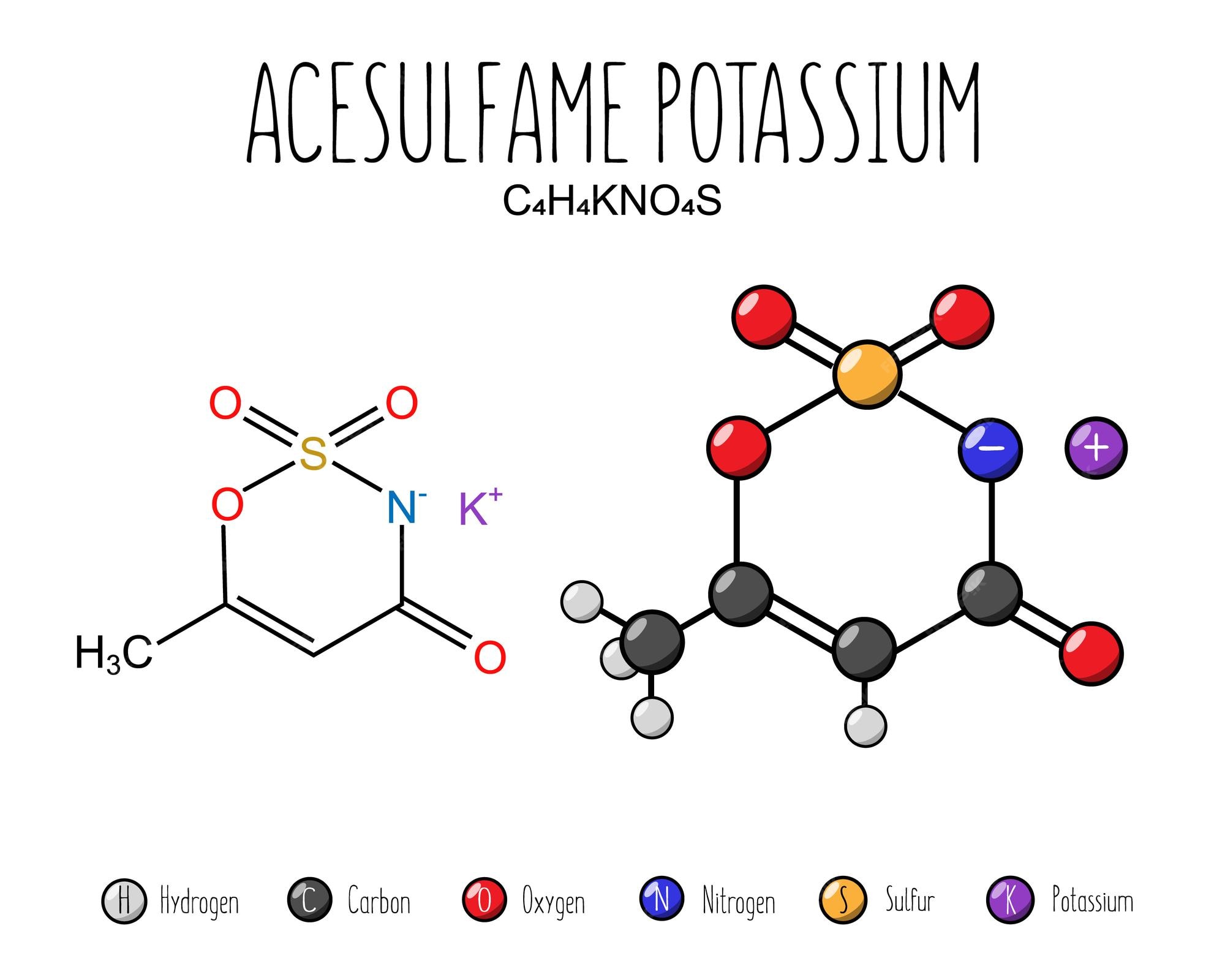
Is Acesulfame K Bad for You? Unveiling the Truth Behind This Artificial Sweetener
In a world increasingly conscious of sugar intake, artificial sweeteners have become ubiquitous. Among them, acesulfame potassium, commonly known as acesulfame K (Ace-K), stands out. But the persistent question remains: is acesulfame K bad for you? This article delves into the science, separating fact from fiction, and provides a comprehensive overview of the safety and potential concerns surrounding this widely used sugar substitute.
What is Acesulfame K?
Acesulfame K is an artificial sweetener discovered in 1967. It’s about 200 times sweeter than sucrose (table sugar) and is often used in combination with other sweeteners like aspartame or sucralose to mask any potential aftertaste and enhance overall sweetness. Its stability under heat and its long shelf life make it a popular choice in a variety of food and beverage products. Acesulfame K is found in everything from diet sodas and sugar-free candies to baked goods and even some medications.
Regulatory Approval and Safety Assessments
Acesulfame K has been approved for use by numerous regulatory bodies worldwide, including the U.S. Food and Drug Administration (FDA), the European Food Safety Authority (EFSA), and Health Canada. These agencies have conducted extensive reviews of scientific data to determine its safety. The FDA, for instance, has set an Acceptable Daily Intake (ADI) of 15 milligrams per kilogram of body weight per day. This ADI represents the amount of acesulfame K that can be consumed daily over a lifetime without any appreciable risk.
The safety assessments typically involve evaluating a wide range of studies, including:
- Toxicology Studies: These studies examine the potential for acesulfame K to cause harm to animals, including effects on organ systems, reproduction, and development.
- Metabolic Studies: These studies investigate how the body processes and eliminates acesulfame K. Notably, acesulfame K is not metabolized by the body; it is excreted unchanged in urine.
- Carcinogenicity Studies: These studies assess whether acesulfame K can cause cancer.
- Human Studies: These studies evaluate the effects of acesulfame K consumption on human health, including blood glucose levels, insulin response, and other relevant parameters.
Potential Health Concerns and Controversies
Despite regulatory approvals, some concerns and controversies surround acesulfame K:
Cancer Risk
One of the most frequently raised concerns is the potential link between acesulfame K and cancer. Some older studies, particularly those conducted in the 1970s, raised questions about its carcinogenicity. However, these studies have been widely criticized for methodological flaws. Modern, well-designed studies have not found any evidence that acesulfame K causes cancer in humans or animals at levels typically consumed.
Regulatory agencies like the FDA and EFSA have thoroughly reviewed the available evidence and concluded that acesulfame K is not carcinogenic. The European Commission’s Scientific Committee on Food also affirmed the safety of acesulfame K concerning cancer risk.
Methylene Chloride Contamination
Early concerns about acesulfame K stemmed from the presence of methylene chloride, a known carcinogen, in the manufacturing process. However, current manufacturing processes have significantly reduced or eliminated methylene chloride contamination. Regulatory agencies monitor the production of acesulfame K to ensure compliance with safety standards.
Potential Metabolic Effects
Some studies suggest that artificial sweeteners, including acesulfame K, may influence gut microbiota and potentially affect glucose metabolism. While the exact mechanisms are still being investigated, some research indicates that artificial sweeteners might alter the composition and function of gut bacteria, potentially leading to glucose intolerance or insulin resistance in some individuals. However, these findings are not consistent across all studies, and more research is needed to fully understand the potential impact of acesulfame K on metabolic health.
Headaches and Other Side Effects
Anecdotal reports suggest that some individuals may experience headaches, mood changes, or other side effects after consuming acesulfame K. However, these reports are not supported by robust scientific evidence. Well-controlled studies have not consistently shown a link between acesulfame K consumption and these symptoms. It’s important to note that individual sensitivities to food additives can vary, and some people may be more susceptible to adverse effects than others. If you suspect that acesulfame K is causing you problems, it’s best to consult with a healthcare professional.
Acesulfame K in Foods and Beverages
Acesulfame K is widely used in various food and beverage products, including:
- Diet Sodas and Other Sugar-Free Beverages: It’s frequently used in combination with other sweeteners to provide a sweet taste without the calories of sugar.
- Sugar-Free Candies and Chewing Gum: It helps to create a sweet flavor without contributing to tooth decay.
- Baked Goods: It can be used to reduce the sugar content of cakes, cookies, and other baked goods.
- Tabletop Sweeteners: It’s available as a standalone sweetener or in blends with other artificial sweeteners.
- Pharmaceutical Products: Some medications and syrups contain acesulfame K to improve their palatability.
Who Should Be Cautious?
While acesulfame K is generally considered safe for most people, some individuals may need to exercise caution:
- Pregnant and Breastfeeding Women: While regulatory agencies have deemed acesulfame K safe for these populations within the ADI, it’s always advisable to consult with a healthcare provider before consuming artificial sweeteners during pregnancy or breastfeeding.
- Individuals with Phenylketonuria (PKU): Acesulfame K itself does not contain phenylalanine, but it is often used in combination with aspartame, which does. People with PKU must avoid aspartame to prevent phenylalanine buildup.
- Individuals with Known Sensitivities: Some people may be sensitive to artificial sweeteners and experience adverse effects. If you suspect you are sensitive to acesulfame K, it’s best to avoid it and consult with a healthcare professional.
The Bottom Line: Is Acesulfame K Bad for You?
Based on the available scientific evidence and regulatory approvals, acesulfame K is generally considered safe for consumption within the established Acceptable Daily Intake (ADI). Extensive research has not demonstrated a clear link between acesulfame K and cancer or other serious health problems. However, as with any food additive, individual sensitivities can vary. Some people may experience mild side effects, although these are not consistently reported in scientific studies.
If you have concerns about acesulfame K or any other artificial sweetener, it’s always best to consult with a healthcare professional or registered dietitian. They can provide personalized advice based on your individual health status and dietary needs. Moderation is key. While acesulfame K can be a useful tool for reducing sugar intake, it’s important to consider the overall context of your diet and lifestyle. A balanced diet rich in whole, unprocessed foods is the foundation of good health.
Ultimately, the decision of whether or not to consume acesulfame K is a personal one. By understanding the science and weighing the potential risks and benefits, you can make an informed choice that’s right for you. Remember that numerous studies have been conducted to assess if acesulfame K is bad for you, and the majority suggest it’s safe when consumed within recommended limits. Considering all aspects of your health and lifestyle will help you determine if acesulfame K fits into your dietary habits. Further research continues to explore the long-term effects of artificial sweeteners, including acesulfame K, so staying informed is essential for making well-rounded decisions regarding your health. [See also: The Effects of Artificial Sweeteners on Gut Health] and [See also: Understanding Acceptable Daily Intake Levels].
Therefore, while the question “is acesulfame K bad for you?” continues to be asked, the current consensus is that it is not, provided it’s consumed within the guidelines set by regulatory bodies. Staying updated with the latest research and consulting healthcare professionals remains the best approach for making informed decisions about your dietary choices regarding acesulfame K.
In conclusion, while potential side effects of acesulfame K exist for some individuals, the overwhelming scientific data supports its safety when used in moderation. The key takeaway is to be mindful of your overall diet, listen to your body, and consult with healthcare professionals if you have any specific concerns about acesulfame K or its impact on your health. Remember, acesulfame K is just one component of a much larger picture of health and wellness.

